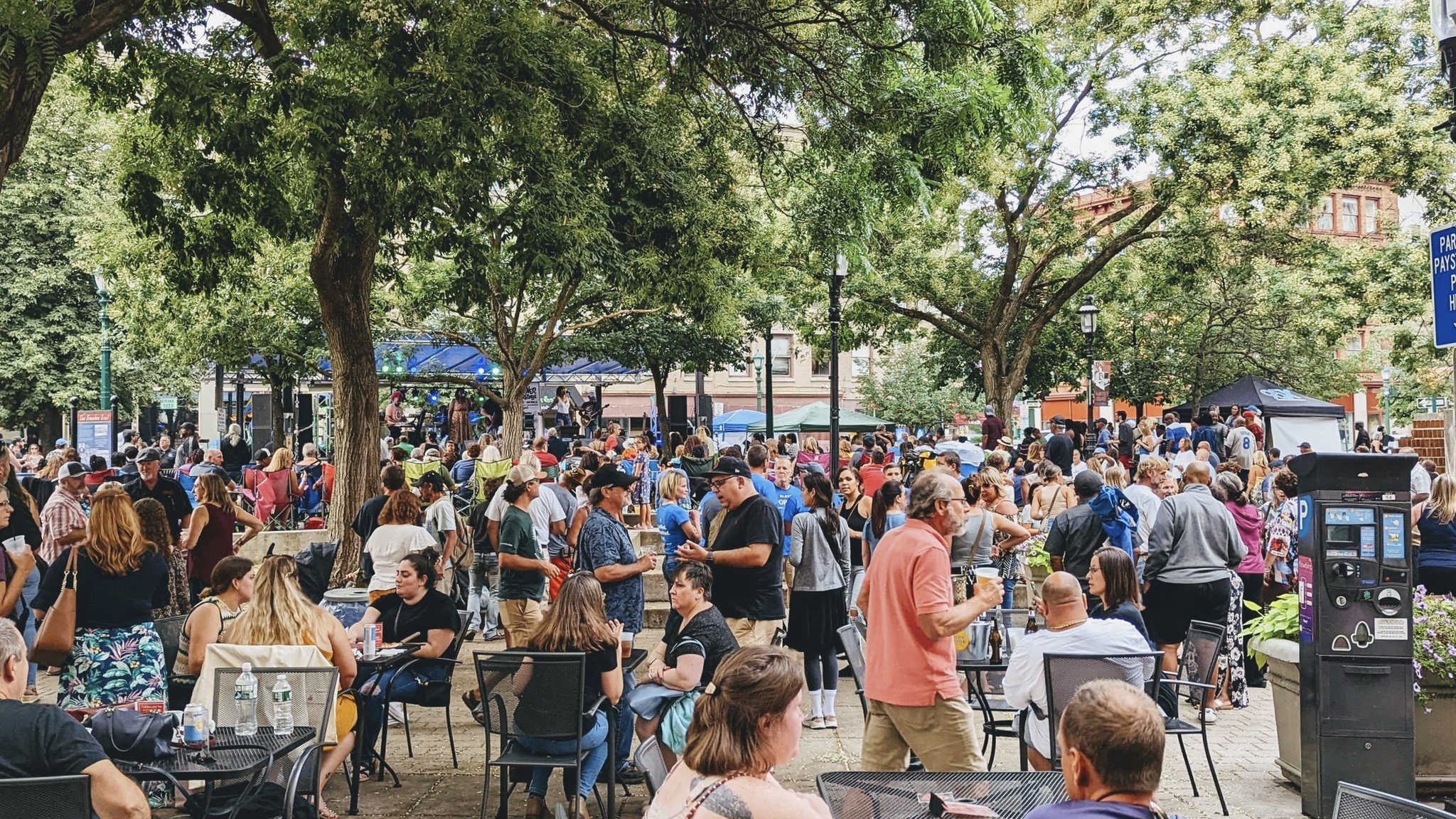Grenadian-Canadian banjo singer and vocalist, Kaia Kater, returned to Caffe Lena on Thursday, June 6 to promote her folk album, Grenades. The 2018 album highlights Kater’s lush, tenor voice to tell the story of her father’s immigration from Grenada after the US invasion in 1983. The talented Kater, whose velvety voice and traditional use of folk tells a story of social injustice, inspired a small group of fans to leave their home sofas. They sat on Lena’s comfy couches for the night to hear songs laced with themes exposing racism and ethnocentrism, told with raw honesty and soothing sound.

Accompanied by Dan Riccione on electric guitar and vocals, and Andrew Ryan on upright bass and vocals, Kater informally took the stage at the historic Caffe Lena with a brief “hi” before launching into her song “St. Elizabeth.” The small crowd of approximately 40 audience members quieted quickly as she plucked her banjo, creating a soul soothing sound. And just like that, Kater had the house’s full attention.
The 25-year-old Kater demonstrated wit and dry humor when speaking of herself as “much older and wiser now,” when contrasted to her tour approximately three years ago that brought her to Saratoga. Her current tour was intended to showcase the new album Grenada, an album she envisioned would help her move forward “by looking at the past.” But first, she revisited “The Heavenly Track,” an earlier piece that used vocal harmonies to raise the audience’s spirit and sense of hope.

Kater played newsreels and interviews with her father sporadically in between the songs inspired by his immigration story, starting with the excitement of her father Dino’s memory of the peaceful revolution that brought Maurice Bishop to power in 1979. Her responsive songs captured the hopeful energy of a time with major chords and somewhat naïve lyrics representing a time in Grenadian history, that shifted despair to hope for many. “Meridian Ground” and “Canyon Land” both paired faster moving sections of the songs with slower, drawn out choruses, emphasizing both the uncertainty and the hope of the era.
Kater returned to a previous favorite next with “Nine Pin,” juxtaposing satisfying harmonies once again with desperate lyrics about loss of self. Shortly after, as if reading the audience’s emotional state, Kater returned to the Grenada theme, playing a news reel about how the National Women’s Organization in the early 1980s were providing education and social service support to the young. The trio, accompanied only by the bass, sang a folk-esque song in French, sounding like children’s voices. Kater smiled, admitting she liked singing that song. The audience had too, resting back a bit more, and breathing easier.

“Starry Day” and “New Colossus” finished the first set. Kater, just like those in folk before her, had a reason to tell her stories and was pleased to share them with the focused audience. She shared that “New Colossus” was inspired by the famed Emma Lazarus poem printed on the Statue of Liberty. “I always loved the Statue of Liberty. Here’s this huge woman, holding a torch, taking up space.” She suggested the statue was a reminder of how “bad-ass” women can be, and her song: a reminder to women to take up the life long work to be bigger and take up space. The inclusion of the statue, often a sign of hope for immigrants, brought the audience back to the reminder that the overarching story of the night belonged truly to immigration.
After a longer break of thirty minutes, the trio returned for a second set. “Everything is free” was her opener, a song by Gillian Welch and David Rollings. Featuring both guitar and bass solos, the group’s energy seemed to crescendo into the second song, “Little Sorrow,” written by Kater’s aunt, Julia Kater. The bass’ long and slow bow strokes, combined with Kater’s authentically sorrowful voice, translated the meaning of the song sung in French, even for non-French speakers.
And from there, the group transitioned back to Grenada with perhaps one of the most powerful pieces of the night: “Grenade.” Ronald Reagan sent a war to Grenada in 1983 with over 18,000 troops landing on the small island. Punished for their successful use of African culture and social-economic successes based in community efforts, supporters of Maurice Bishop on the island found themselves with nowhere to hide. The Reagan recording expressed Grenada’s successes were a threat somehow to Americans; he demanded its citizens to “act like the hemisphere” in which they live rather than embrace African cultures or face invasion. And with that, the US brought war to Grenada.

The song’s minor key shadowed the sadness felt in all that was lost, including Dino’s dreams of serving his community as a lawyer. The song described the dogs of war marching into the small island and the sense of powerlessness felt by the citizens there: “You can shout at the mountain / but they’ve already crowned him.”
It reflected that there was little resistance to the US’s government of choice for Grenada. “We always seem to get played” was a heart -breaking reminder of how America’s ethnocentric policies were more than rhetoric; implemented in developing countries around the world to enforce American values. These policies stole the very hopes and dreams of entire countries, and led us to our current crisis within the world as well.
Kater didn’t let the audience stay with this heartbreak, though. She told a light -hearted story about a Swedish vampire movie that inspired the next song, “The Right One.” Watching the bass player look at Kater, it wasn’t hard to imagine that he believed she is absolutely his right one. Gazing at her in a trance, the musician’s admiration for his colleague was tremendously moving and joyful. Riccione and Ryan playfully made ‘scary movie’ music as she tried to playfully explain her song, and even Kater started to laugh at their antics.
The ensemble’s friendship is a part of its charm. From there, they ran through a number of other songs, bouncing between moods, like a rapidly cycling manic-depressive. “Everly” reflected on falling apart, while “Little Pink” was a traditional song from West Virginia ,demonstrating Kater’s vocal range.

Kater humbly thanked the audience repeatedly, and expressed enjoyment in playing at the historic Lena. She finished the night with her father’s story of resiliency. He was able to escape Grenada through a student program chosen to tour Quebec to raise empathy and awareness of the plight of those in developing countries. Encouraged by his grandmother, Kater’s father let go of his dream to work in the public sector in Grenada and pursue his new life in Canada. “Poets be buried” was a moving testimony to his struggles and courage.
Kater generously returned for an encore performance of “Trouble in Mind,” a bluesy folk song with a heavy bass line and smooth guitar. She let go of her banjo and crooned about the ups and downs of life. “Sometimes I feel like living, sometimes I feel like dying,” she sang.
Kater began the night by sharing her belief that she had to look at her past in order to move forward, and her album Grenade looks at Grenada’s past with honesty that is painful at times. It is also inspiring, hopeful, and at the end of the concert, mindful, that being human includes sorrow alongside joy. Kater certainly appears ready now to move forward, fully aware of her family’s past and using the tradition of folk’s raw honesty to remind listeners that ugliness juxtaposed with great beauty offers hope.



